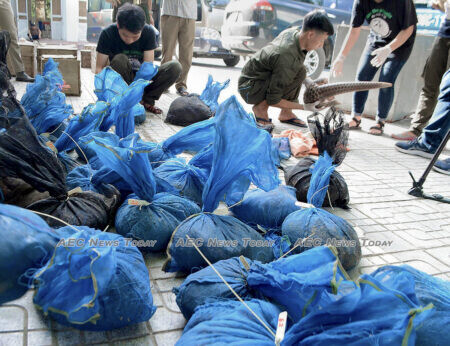As Vietnam races to track down the origin of its first SARS-CoV-2 community transmission in almost 100 days, Prime Minister Nguyen Xuan Phuc has issued a sweeping directive aimed at wiping out almost all vestiges of the country’s trade in wildlife, mobilising dozens of ministries to enforce the order in the process.
For long a major transit and destination point for illegally trafficked wildlife, or their body parts, fear of a home-grown zoonotic crossover event similar to one theory of how the global SARS-CoV-2 outbreak began in China has prompted the action, with the order encompassing almost every aspect of the wildlife trade.
The order comes less than two weeks after the Cambodian province of Siem Reap announced a ban on the dog meat trade there for the same reasons, and follows a recent World Wildlife Fund (WWF) for Nature Cambodia report warning of the ongoing risk in Lao PDR, Cambodia and Vietnam.
Amongst its findings the survey found that between 20-80 per cent of urban Vietnamese eat wildlife meat products at least once a year, with 60 to 80 per cent of wildlife meat consumption in urban centers taking place in restaurants
In February more than 14 wildlife organisations sent a joint open letter to Prime Minister Phuc, urging him to “take strong and sustainable actions to halt all illegal wildlife trade and consumption in Vietnam”, citing the potential for future zoonotic disease outbreaks as one reason.
Wildlife ban covers dead or alive animals

Prime Minister Phuc’s directive last Thursday bans the import and sale of either dead or alive wild animals, as well as their eggs, larvae, body parts, and other derivatives sold both in markets and online.
The order also calls for the shut down of markets and places illegally trading wild animals, as well as for a clamp down on illegal hunting, capturing, trading, transporting, slaughtering, or advertising wild animals.
“All citizens, especially officials, must not participate in illegal poaching, buying, selling, or transporting of illegal wildlife.
“This rapacious appetite for wildlife is endangering not just these species’ survival, but as we have seen with the coronavirus outbreak, it is endangering people’s lives too”, the directive reads.
While Vietnam already has in place penalties for illegal hunting, killing, transporting, possessing, and trading of protected animals, authorities have been tasked to propose changes to the law regarding punishment for illegal wildlife consumption, the directive noted.
Currently those found guilty of violating laws protecting endangered species face up to 15 years in prison, with a fine of up to VND15 billion (about US$648,000).
Vietnam’s move to ban the wildlife trade follows a similar move by the Chinese government to temporarily ban the sale of wildlife in markets, restaurants and online platforms.
Loopholes remain in wildlife order
The move has been applauded by conservation groups, who have constantly taken a swipe at the government for turning a blind eye to the booming wildlife trade.

Director of Save Vietnam’s Wildlife, Nguyen Van Thai told Reuters that “the wildlife consumption ban mentioned in the directive is insufficient as some uses of wildlife such as medicinal use or wild animals being kept as pets are not covered. It would be better to have a clear and detailed list of the various uses of wildlife that are prohibited”.
Both legal and illegal wildlife trading has persisted in Asean for decades in thousands of markets, many of which also have an online presence, advertising and selling animals for food or as pets.
Last July the European Union (EU) announced a €10 million (about $11.14 million) project which will run through until December 2022 aimed at disrupting the flow of illegally trafficked wildlife through the Greater Mekong region, Malaysia, and China.
A report last year by the Environmental Intelligence Agency (EIA) titled Running out of Time said that Vietnam was implicated in over 600 seizures linked to the illegal wildlife trade involving the deaths of about 15,799 elephants, 610 rhinoceros, 228 tigers, and 65,510 pangolins
The United Nations Office of Drugs and Crime (UNODC) estimates that the global wildlife trafficking industry is valued at between $7 billion and $23 billion annually.
Feature video CNA
Related:
- UPDATE 1-Vietnam bans wildlife trade to curb risk of pandemics (Reuters)
- Vietnam considers wildlife trade ban in response to coronavirus pandemic (Mongabay)
- Vietnam suspends wildlife trade as pandemic prods action (Eagle News)
Stella-maris Ewudolu
Between November 2010 and February 2012 she was a staff writer at Daylight Online, Nigeria writing on health, fashion, and relationships. From 2010 – 2017 she worked as a freelance screen writer for ‘Nollywood’, Nigeria.
She joined AEC News Today in December 2016.
Latest posts by Stella-maris Ewudolu (see all)
- Zoonotic crossover fear sees Vietnam ban (almost) all wildlife trade (video) – July 26, 2020
- Job & revenue losses: COVID-19 to hurt Asean airlines the most – July 24, 2020
- Philippines morning news for July 24 – July 24, 2020
- Philippines morning news for July 23 – July 23, 2020

